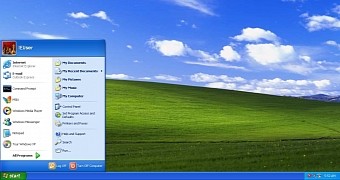The latest batch of market share stats provided by NetMarketShare reveals one very surprising growth experienced last month.
Windows XP, the desktop operating system launched nearly 16 years ago and which no longer receives updates since April 2014, improved its share by no more, no less than 1.28 percent, even though everyone advises users against sticking with this old software.
Windows XP was one of the targets of the WannaCry ransomware outbreak that started in May, with Microsoft itself deciding to publish an emergency patch to keep users protected.
In the end, it turned out that Windows 7 was more vulnerable than Windows XP when it comes to WannaCry, but it’s very clear that despite the risks caused by sticking with a 16-year-old operating system, users aren’t concerned enough to start planning an upgrade.
Surprising growth
NetMarketShare data reveals that Windows XP improved its share from 5.66 percent to 6.94 percent last month, becoming the third most used desktop operating system worldwide, after Windows 7 and Windows 10. Windows 8.1 is very close with 6.40 percent, and unless a major decline is experienced by Windows XP, there’s a good chance these rankings won’t change the next month.
The more surprising thing is that Windows XP has declined for several months in a row, and this is absolutely normal given that support is no longer offered. For example, back in August 2016, Windows XP was running on 9.36 percent of PCs worldwide, and with a few exceptions, it lost market share every single month. In May it collapsed from 7.04 percent to 5.66 percent.
The most recent growth, however, comes after one of the biggest ransomware outbreaks in the last decade, and Windows XP was one of the vulnerable operating systems and it wasn’t even supposed to get a patch from Microsoft.
Without a doubt, it’ll take more than anyone expected for Windows XP to go dark, but the sooner, the better, especially because the operating system is running on critical systems handling our data, including here airports, hospitals, and police forces.

 14 DAY TRIAL //
14 DAY TRIAL //